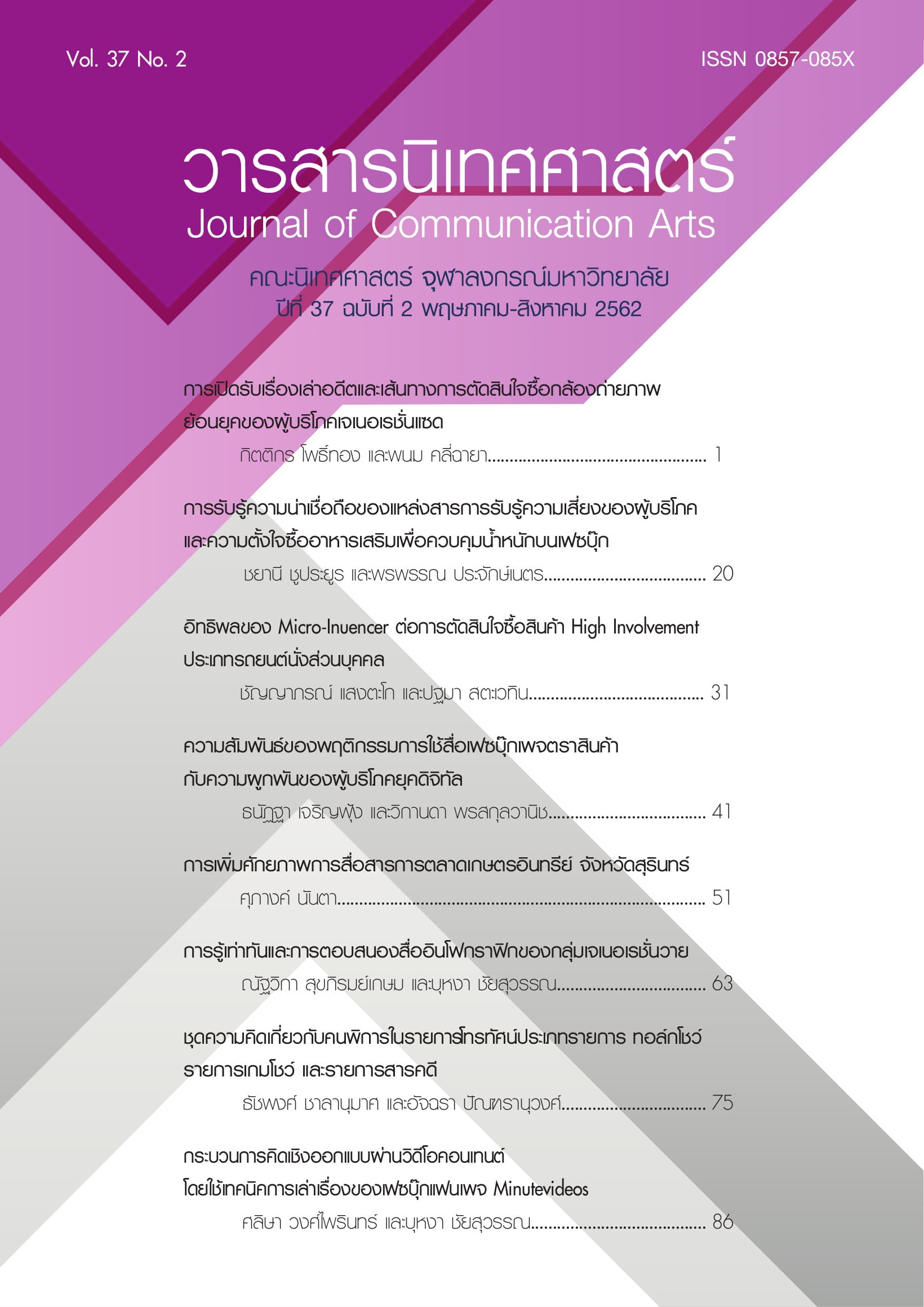The Relationship between Facebook Brand Page Usage and Customer Engagement in Digital Age
Main Article Content
Abstract
The purpose of this research is to study the relation of Facebook and Facebook Brand Page usage behavior in the aspects of number of times and duration. The relation follows the theory of Uses & Gratifications that affect customer engagement in the digital age, which can be divided in 4 aspects: involvement, interaction, intimacy, and influence. The study is based on quantitative research and survey research using questionnaire with 400 non-probability sampling and purposive sampling to the group of 18 years old or over, starting from Millennials (aged 18-34 years old) who are marketer’s primary target. The result is as follows: 1. Facebook and Facebook Brand Page usage behavior in terms of duration per day has positive relation with customer engagement in the involvement aspect. This means the more users spend their time on Facebook and Brand Page, the higher involvement is likely to be. Conversely, the less users spend their time on Facebook and Brand Page, the less involvement is likely to be. 2. Facebook and Facebook Brand Page usage behavior in terms of duration and number of times per day is positively related to customer engagement in the interaction aspect. This means the users that spend more time and have more number of times per day using Facebook and Facebook Page brand tend to have higher interaction. On the contrary, the users that spend less time and have less number of times per day using Facebook and Facebook Brand Page tend to have less interaction. 3. Facebook and Facebook Brand Page usage behavior in terms of duration and number of times per day has no relation with customer engagement in the intimacy aspect. 4. Facebook and Facebook Brand Page usage behavior in terms of duration per day has positive relation with customer engagement in the influence aspect. This means the users that use Facebook and Facebook Page brand in longer duration are more likely to be influenced. Contrarily, the users that use Facebook and Facebook Brand Page in shorter duration are less likely to be influenced.
Article Details
References
ชฎาภา อนันต์กิตติกุล. (2554). ความสัมพันธ์ระหว่างพฤติกรรมการใช้เว็บไซต์เครือข่ายสังคมกับความผูกพันทุ่มเทของลูกค้า. วิทยานิพนธ์ปริญญามหาบัณฑิต สาขาวิชาเทคโนโลยีการจัดการ มหาวิทยาลัยเทคโนโลยีสุรนารี.
ธนัฏฐา เจริญฟุ้ง. (2560). ลักษณะบุคลิกภาพห้าองค์ประกอบ ทัศนคติ พฤติกรรมการใช้สื่อและความผูกพันผู้บริโภคยุคดิจิทัล เฟซบุ๊ก เพจตราสินค้า. รายงานสืบเนื่องงานประชุมวิชาการการสื่อสารระดับชาติ ครั้งที่ 2 ประจำปี 2561, 206-221.
ทิพภากร รังคสิริ, ธนวรรณ แสงสุวรรณ และปรัชญนันท์ นิลสุข (2557). ทัศนะการตลาด: รูปแบบการจัดการศึกษาไทย บนแนวคิด “นักเรียน คือ ลูกค้า.” จุฬาลงกรณ์ธุรกิจปริทัศน์, 36(141), 18-35.
ปวีณา วิจิตรเจริญ. (2556). ปัจจัยที่มีผลต่อการมีปฏิสัมพันธ์ (Engagement) บน Facebook Fan page กรณีศึกษา หน่วยงานของมหาวิทยาลัยแห่งหนึ่ง. งานวิจัยส่วนบุคคลมหาบัณฑิต สาขาวิชานโยบายและการบริหารเทคโนโลยีสารสนเทศ มหาวิทยาลัยธรรมศาสตร์.
รจิตลักขณ์ แสงอุไร. (2559). วารสารสนเทศโลกาภิวัตน์. กรุงเทพฯ: จุฬาลงกรณ์มหาวิทยาลัย.
วสุพล ตรีโสภากุล. (2558). การศึกษากระบวนการและปัจจัยเชิงสาเหตุของความยึดมั่นผูกพันบนเฟซบุ๊กแฟนเพจในกลุ่มผู้บริโภคคนไทย. ปริญญานิพนธ์ปรัชญาดุษฎีบัณฑิต สาขาวิชาการวิจัยพฤติกรรมศาสตร์ประยุกต์ มหาวิทยาลัยศรีนครนทรวิโรฒ.
วิเลิศ ภูริวัชร (2553). Customer engagement ในวันเลนไทน์. กรุงเทพธุรกิจ, 6-7ม วันที่เข้าถึงข้อมูล 4 เมษายน 2561 แหล่งที่มา http://library.acc.chula.ac.th/page-fragment/FindInformation/ArticleACC/2553/Wilert/Bangkokbiznews/B1402101.pdf
Lee, C., Chou, S. T., & Huang, Y. (2014). A study on personality traits and social media fatigue--Example of Facebook users. Retrieved April 15, 2019, from http://www.lnit.org/index.php?m=content&c=index&a=show& catid=37&id=99
Haven, B. (2007). Marketing's new key metric: Engagement. Retrieved April 8, 2019, from http://snproject.pbworks.com/f/NewMetric_Engagement.pdf
Malthouse, E. C., Haenlein, M., Skiera, B., Wege, E.,, & Zhang, M. (2013). Managing customer relationships in the social media era: Introducing the social CRM house. Journal of Interactive Marketin--Special Issue in Social Media, (2), 270-280.
Verhoef, P. C., Reinartz, W. J., & Krafft, M. (2010). Customer engagement as a new perspective in customer management. Journal of Service Research. 13(3), 247-252.


